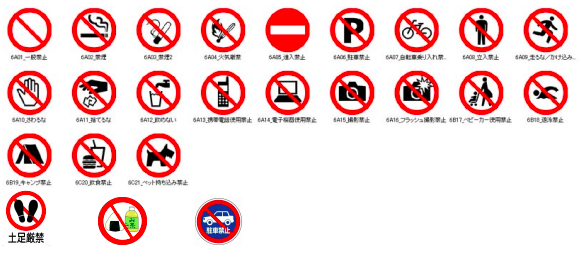2.2: 会話2
- Page ID
- 31569
During a visit to a historic temple
Guide: Koko wa kin-en desu. ここは禁煙 きんえん です。 No smoking here.
Michael: Kin-en tte dou iu imi? 禁煙って、どういう意味 い み ? What does ‘kin-en’ mean?
Honda: Tabako wa suwanai de tte iu imi. タバコ吸 す わないでっていう意味 い み 。It means ‘please do not smoke.’ ……
Michael: Shashin totte mo ii desu ka. 写真 しゃしん 、撮 と ってもいいですか。 Is it okay if I take pictures?
Guide: Douzo. De mo furasshu wa goenryo kudasai. どうぞ。でも、フラッシュはご遠慮 えんりょ ください。 Please. But please no flash pictures.
Vocabulary
kin-en きんえん 禁煙 No Smoking
dou iu どういう what kind; descried how
imi いみ 意味 meaning
dou iu imi どういう意味 what does it mean
tabako タバコ tobacco; cigarette
suu すう 吸う smoke; inhale
totte mo とっても 撮っても even if you take (pictures) (See 10-1-1)
totte mo ii とってもいい撮ってもいい it’s okay even if you take (pictures )
furasshu フラッシュ flash
enryo えんりょ 遠慮 holding back, decline
goenryo ごえんりょ ご遠慮 holding back (polite)
goenryo kudasai ご遠慮ください Please refrain from …
+kinshi きんし 禁止 forbidden; prohibited
+chuusha ちゅうしゃ 駐車 parking
+chuusha kinshi 駐車禁止 No Parking
+enujii えぬじい NG no good, not allowed

Grammar Notes
Expressing Permission
Earlier, we learned that we can ask for permission by simply saying ‘Ii desu ka?’ when it is clear from the context what we are asking permission for. For example, if someone raises her camera and says ‘Ii desu ka?’, it’s clear that she wants permission to take pictures. If a stranger points to an empty seat next to you and says ‘Ii desu ka?’, he is asking if he can sit there. However, when the context is not clear, we need to express ourselves more specifically.
To ask for permission for a specific action, you use the ~te form of the verb.
Shashin totte ii desu ka. Is it okay if I take pictures? Or, Can I take pictures?
It is common to add mo to the V ~te form, which means ‘EVEN if you do V’.
Shashin totte mo ii desu ka. Is it okay even if I take pictures?
The other te-forms--/adjective-kute/ and /noun de/ --are also used in this pattern with or without /mo/.
Takakute mo ii desu. It’s okay even if it’s expensive.
Eigo de mo ii desu. It’s okay even if it’s English. or English is fine.
Enryo: The Virtue of Holding Back
Enryo means hesitating out of politeness, which is one of the most highly valued virtues in Japan. When offered something, you are usually expected to do some enryo before accepting it. Thus, sometimes “no” may not mean “no” and indicate enryo instead. To play it right, pay attention to tone of voice and facial expressions.
You can urge someone not to worry about being polite by saying:
Enryo shinai de.
Enryo shinai de kudasai.
Douzo, goenryo nasaranai de kudasai.
To accept the offer, the expression enryo naku ‘without enryo’ is commonly used.
Sekkaku desu kedo, enryo shimasu. Thank you, but no thank you.
X wa goenryo kudasai is a polite expression commonly used to ask someone to refrain from doing X. This is much more polite than X kinshi.
Otabako wa goenryo kudasai. Please refrain from smoking.
Keitai wa goenryo kudasai. Please refrain from using cellphones.

